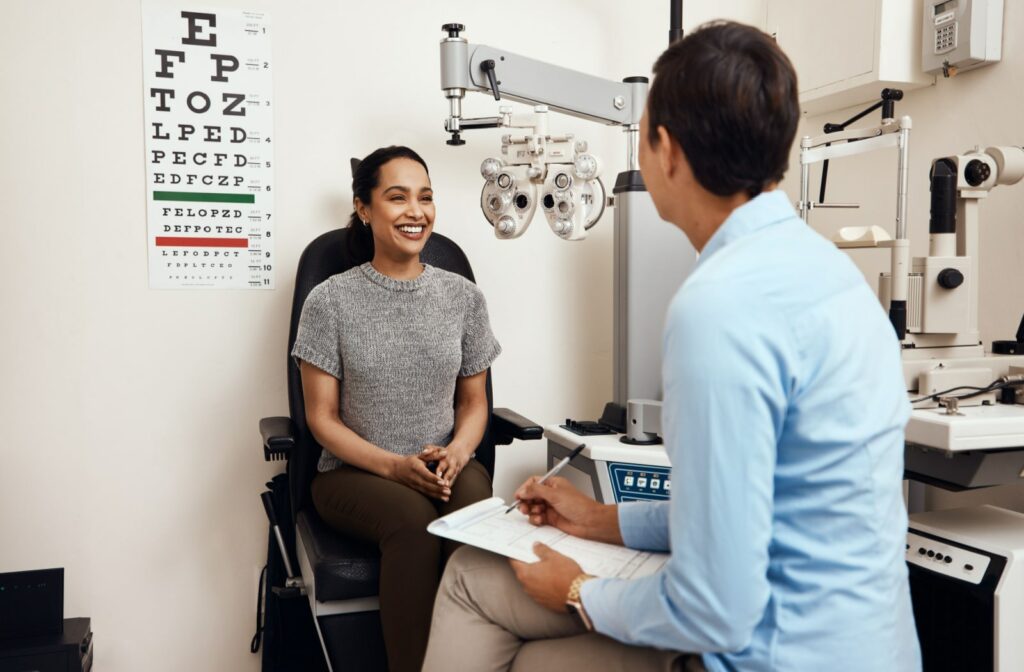Your vision is one of your most important senses, and it is important to take proper care of your eyes. There are several routines and habits you can use to maintain eye health, including visiting an eye doctor for regular comprehensive eye exams.
A comprehensive eye exam typically includes having your optometrist ask questions about your overall health and perform a series of tests to evaluate your vision and ocular health. Unlike a standard vision test, a comprehensive eye exam might include a range of different tests to check your eyes for conditions like glaucoma, macular degeneration, or dry eyes.
Your optometrist can help you understand both what to expect from a comprehensive eye exam and why the tests they may perform are important for evaluating your eye health.
Tests Done During a Comprehensive Eye Exam
Here are some standard tests you might receive during a comprehensive eye exam:
Medical History Discussion
A comprehensive eye exam may begin with a discussion of your general health and any symptoms of vision issues you may be experiencing. Your eye doctor may also ask if you are taking any medications or if you have a family history of specific eye diseases.
Visual Acuity
A visual acuity test is intended to measure the clarity of your vision and how your eyes can see. In many cases, your optometrist may use a Snellen chart, which involves reading letters off a chart that vary in size.
Keratometry
A keratometry test is generally done to measure the curvature of your eye, looking for any abnormalities that could affect your vision. Some test variations may include focusing a circle of light on the cornea to measure its reflection.
Refraction Test
Astigmatism, nearsightedness, and farsightedness are some of the common refractive errors your eye doctor may look to spot. Refraction tests are commonly done to help identify the prescription and lens power that may be needed to combat different refractive issues in your eyes.
During a refractive test, a phoropter may be used to place different lenses in front of your eyes, so you and your eye doctor can determine which prescription provides the clearest vision.
Slit-Lamp Test
A slit-lamp test involves using a specialized tool that allows your eye doctor to see a three-dimensional, magnified view of the different parts of your eye. It can be a helpful test to look for any potential future ocular health issues.
Binocular Function Testing
Your optometrist may use different assessments for measuring your eye mobility to determine how well your eyes move and work in unison. They will look for any signs that your eyes find it difficult to move together.
Colour Vision Test
A colour vision test involves looking at a series of images that typically shows several different coloured circles and numbers. Your eye doctor will ask you to identify the numbers to determine your ability to see different colours.
If you have any questions concerning other tests or what to expect during a comprehensive eye exam, please feel free to call our office and speak with our friendly staff.
When Should You Get a Comprehensive Eye Exam?
Regular eye exams are important to care for your eyes and vision. Here is some insight into how frequently you may need to book your eye exam.
Infants
Visual ability can have a significant role in your child’s early development. It is recommended that a child has their first eye exam between the ages of 6 and 9 months. Your doctor will likely look for signs of visual abnormalities like lazy eye or amblyopia, which can be present from a very young age.
Preschoolers
Preschoolers should have annual eye exams between the ages of 2 to 5. During this phase, your child will likely develop hand-eye coordination as they use their hands to complete more tasks. It is also a time when symptoms of other eye conditions might become present, such as the following:
- Eye irritation
- Red eyes
- Lack of concentration
- Sensitivity to light
- Holding objects very closely
If you notice any of these signs in your child, please book an appointment with your optometrist to check their eyes with a professional.
School-Age Children
School-age children should be getting regular annual eye exams. Refractive errors like myopia, hyperopia, and astigmatism may become present at this age. Some symptoms of visual challenges a child may show include:
- Headaches
- Rubbing their eyes
- Losing place while reading
- Performing below their potential in class
- Avoiding near or distant work
Adults
At Total Focus Optometry, we follow the Canadian Association of Optometrists in recommending an eye exam every two years for adults aged 20 to 64, unless specified otherwise by your optometrist. Routine exams can help your optometrist check your visual health and watch for abnormalities or developing conditions.
Seniors
Because the risk for some eye conditions can increase with age, adults over 65 should have an eye exam each year, so their optometrist can consistently check up on their ocular health.
It is crucial to speak with your optometrist about your eye care needs. They can help you set up a routine and provide recommendations on how frequently you should evaluate your eyes. Sometimes, your optometrist may recommend more frequent eye exams if you’re more at risk for developing eye diseases.
Book Your Eye Exam in Edmonton Today
Regular comprehensive eye exams are important for taking care of your ocular health. Please book an appointment at Total Focus Optometry to work with our friendly, experienced team of eye care professionals.



